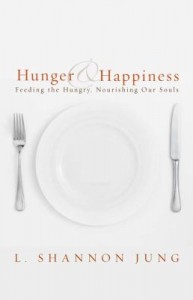The book Hunger & Happiness: Feeding the Hungry, Nourishing Our Souls has been chosen as the book-in-common for fall 2010 first year students. These new students will be asked to purchase the book over the summer and read it before coming to campus. Since Orientation and Critical Issues are two key programs that will engage with the messages and discussion points of this book, many upper-class students will have reason to read the book as well.
 Hunger & Happiness consists of six thoughtful essays in a slim attractive volume. This collection beautifully intersects with the fall Critical Issues Symposium theme of Food. This book, written by a faculty member of St. Paul School of Theology (Kansas City), voices concerns, understandings, and hopes of a person of faith. Chapters explore hungers of the body, as well as of the spirit. It speaks of the food we put in our mouths, as well as the food (thoughts, feelings) we put in our minds and hearts. Written from a Christian perspective, the book’s invitation to dialogue is respectful and inclusive of all faith traditions.
Hunger & Happiness consists of six thoughtful essays in a slim attractive volume. This collection beautifully intersects with the fall Critical Issues Symposium theme of Food. This book, written by a faculty member of St. Paul School of Theology (Kansas City), voices concerns, understandings, and hopes of a person of faith. Chapters explore hungers of the body, as well as of the spirit. It speaks of the food we put in our mouths, as well as the food (thoughts, feelings) we put in our minds and hearts. Written from a Christian perspective, the book’s invitation to dialogue is respectful and inclusive of all faith traditions.
The chapters are full, but not overwhelming. Sample topics include “How Could Cheap Food Be a Bad Thing?” “Appropriations and the Earth Community,” and “Losing and Refinding Our Spiritual Selves.” Jung begins the reader’s journey by offering clear definitions of key terms that he will use throughout the book. “Happiness,” in this context refers to profound spiritual well-being. “Affluence” refers to those of us who are living comfortably ($50,000 annual household income); relative to the majority of the world’s people, we have enough.
We at the library hope that the book-in-common will be embraced and read by many more than those “assigned” to read it. The library has a copy of Hunger & Happiness on reserve that can be checked out overnight, as well as a copy in the stacks. The bookstore has copies available for purchase. Over the course of the summer, please let us know if you have suggestions about anything relating to Hunger & Happiness and how we, as a community, can use it as an opportunity to engage, explore, and grow.
— Priscilla Atkins, Head of Reference and Instruction

